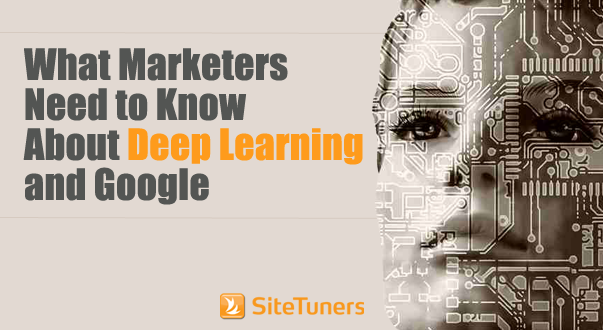 Deep Learning.
Deep Learning.
During 2013’s PubCon KeyNote, Matt Cutts talked this up as one of the key things Google is using to improve search, particularly around having entities and voice search. Facebook AI director Yann LeCun indicates that companies like Facebook and Google will be relying on it more and more – Facebook for sorting items to show people, Google for self-driving cars. And after a somewhat long “AI winter,” companies like Google, Facebook, Microsoft, and IBM are snapping up artificial intelligence and deep learning experts.
For marketers, there’s never been a more important time to learn what’s hype and what’s real. Deep Learning certainly is a game-changer – but perhaps not in the ways you may expect.
Not Like a Brain, Really
It all sounds very “Google-is-SkyNet,” doesn’t it? What imbues it with that kind of mysticism is in part how Deep Learning and AI have been portrayed by the media. But the problem marketers are facing is less about the plot of Terminator 2, and more about the expertise they have around search becoming obsolete.
To understand why, it helps to demystify what Deep Learning really is and isn’t.
The shorthand people sometimes use to describe Deep Learning techniques in AI is that “it works just like a brain.” This is a very tempting phrase to use, because it gets rid of some of the complexity, and people can wrap their heads around machines that learn just like a brain does.
But as Yann notes in a recent interview, this kind of hype is dangerous. Yes, there are some techniques in machine learning that’s inspired by biology, but many, many more techniques that are not. Rather, Deep Learning is about teaching machines pattern recognition – like teaching a car to recognize green, red, and yellow lights, or getting Google to recognize when there’s a face in a picture.
Machines that Learn
What’s deep in Deep Learning is the architecture, not the learnings. It’s about scale.
When Google uses Deep Learning for their “things, not strings” projects, what makes it deep isn’t the fact that you can have better conversational search, but the fact that millions upon millions of “entities” like “Obama” and “president” are getting used, along with tons of patterns about those relationships.
A Brief History of Search Engines
How this relates to search engines and online marketers isn’t readily apparent until you examine the history of how search marketers have been useful.
When search engines where in their nascent phase, Altavista, Google, and other search engines of the time used what’s called the keyword metatag to help determine what a page is about. What “bad” or “blackhat” SEOs did was abuse this – they spammed the keywords in the metatags until Google basically had to give up and say the field is not useful as a signal any more.
This pattern would continue in search moving forward – Google and company would say links are good for search engines, until gamers of the system abused this by building paid link networks that made search results less useful overall when just relying on links. Search engines had to adjust by discounting links that are paid for. Topic-oriented pages are good for search engines, until content farms came along and basically had shallow content for topics. So Panda was born.
So that’s what the ecosystem has generally been like – engineers within search engine companies not saying specifically what makes pages rank, but giving overall directions. “White hat” SEOs would take the spirit of those guidelines and apply them to web sites, and “black hats” would continue to test the system for weaknesses.
That has been going on for about 15 years, and Deep Learning in search threatens to uproot a large part of that ecosystem.
The Machine Knows What the Engineers Do Not
When Amit Singhal and the rest of the Google search team apply changes to the Google search, they essentially introduce algorithms with some knobs tweaked.
But introducing Deep Learning to sections of Google search is a game-changer in the sense that for a particular set of searches, the machine is supplying the relevance; the engineers wouldn’t be able to answer, for instance, if exact match domains are helping, if the social weights are driving most of the ranking for that search, or if the internal architecture of the site is hurting the rank.
The best a Google engineer would be able to say is, “maybe.”
And if the Google engineers themselves do not know, you can bet SEOs do not know, and neither will their clients. That’s what we are facing as Deep Learning systems get better: SEO as a craft will not die, but the breadth of what a standard SEO can reasonably claim to know will be more limited.
How do you Future-Proof Your Skills in a Deep Learning World?
Deep Learning’s impact will not just be felt in search, but for a lot of online marketers, search is table stakes. In the next decade, as these systems get better and more standards get developed, (even engineers from Google and Facebook readily admit we’re not there yet) they will be applicable in more and more areas.
What this means for you as a marketer is if you have the same limited time to brush up on the impact of linking C-blocks for search and split test methodology for usability and conversions, the latter may have just a bit more legs moving forward.
It looks like in the next decade, the skills you should choose are the ones that keep visitors from clicking back once they hit your web site – those will be critical regardless of how much Deep Learning uproots the search results page. Links, social media referrals, on-page elements and other things are still going to be considerations, but you’ll have even less visibility into how important they are than you do today.


